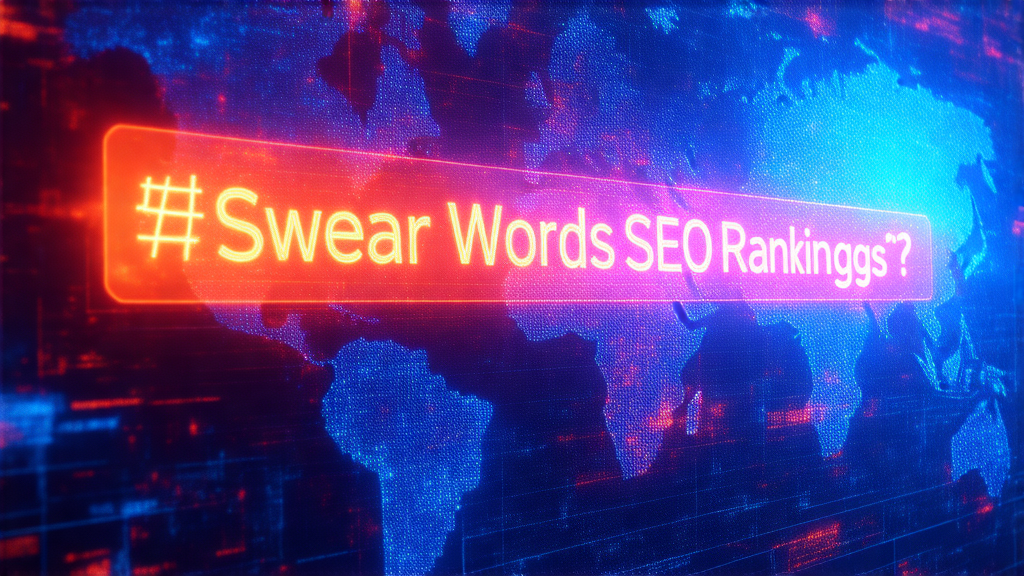The internet has a lot of different content.
You might be curious if using some curse words will get your website penalized by Google.
While Google does not openly share its views on swearing, there are important things to think about.
These include how profanity may affect your website’s search rankings and SEO.
Key Highlights
- While Google doesn’t explicitly penalize for swearing, it can indirectly impact SEO.
- Content deemed unsafe due to strong language may be filtered out by SafeSearch.
- Google might rewrite titles and descriptions containing explicit words.
- Excessive swearing can alienate audiences and hurt brand perception.
- User engagement is crucial for SEO, and offensive language can deter visitors.
Understanding SEO and Content Impact
SEO, which stands for Search Engine Optimization, is about making your website more appealing to search engines like Google.
The better you rank on search result pages, the more people will click on your link.
For SEO, content is very important!
The things you say on your website directly affect how search engines explore and list it.
The words you choose and how you set up your content influence where you appear on those key search result pages.
The Basics of SEO: What Affects Rankings?
Google has complicated rules to rank searches, but some main points stay the same.
First, you need to have high-quality and relevant content.
A website that is easy to use is also important.
This helps both search engines and visitors to find their way around.
Backlinks are links from trustworthy websites to yours.
They matter a lot because they show Google that your site can be trusted.
As a rule of thumb, making good and shareable content is the best way to improve your SEO.
This is better than using quick tricks or shortcuts.
How Content Quality Influences SEO
Content quality is very important for Google.
The search engine looks for content that is helpful, interesting, and relevant to what people search for.
When you publish new posts, articles, or other content regularly, it shows Google that your website is active and current.
Good content also helps you get links from other websites and can lead to more shares on social media.
Both of these things help improve your online presence and boost your SEO.
Keep in mind, if you make content just for search engines and ignore what your target audience wants, it can cause problems.
The Role of Language in SEO

Keywords are very important, but the language on your website is even more important for SEO.
Google’s algorithms have improved a lot.
They now look at full pages to grasp the context, feelings, and user experience.
This means you need to use clear and simple language.
You should organize your content in a logical way.
This is vital for both readability and SEO.
So, how do swear words relate to this?
Does Google Penalize for Swear Words?
Officially, Google is unclear about whether using curse words on your website will lower your SEO.
They do not share a list of banned swear words, and they have not said that they punish sites for using bad language.
Still, that does not mean you should fill your content with bad words.
There is a difference between using a light curse word for impact or fun, and writing content that is very rude.
The main problem with bad words is that they can trigger Google’s SafeSearch filter.
Content that is not suitable for users under 18 may get marked, which means it will not show up in search results when SafeSearch is turned on.
The Effect of Audience Perception on Engagement Metrics
While Google may not warn you about using bad language, your audience might not like too much swearing.
What the audience thinks affects engagement metrics, which do play a role in SEO.
Engagement metrics are things like bounce rate (how fast people leave your site), time spent on a page, and click-through rates.
If a visitor finds your website and sees offensive words right away, they will likely leave quickly.
However, using an occasional swear word in a smart way, especially in areas where it fits the brand, might connect with your audience and even boost engagement.
SEO Myths vs. Facts

Let’s set the record straight by busting some myths.
The world of SEO is full of misunderstandings.
It’s easy to believe old advice or false claims.
When we talk about swear words and search rankings, knowing the facts is important.
Keep in mind that just because two things happen at the same time, it doesn’t mean one caused the other.
What helps one website may not help another.
Myth: Swear Words Directly Lower Rankings
This is a common misunderstanding.
It is true that too much swearing can harm your website in some ways.
However, there is no proof that Google punishes websites just for using curse words in their text.
Curse words do not harm SEO directly, but they can affect it indirectly.
For example, if a website uses very offensive language often, it might turn away visitors.
This can lead to lower interaction, fewer backlinks, and even bad reactions on social media.
All of these things can hurt your search rankings over time.
It’s like a chain reaction, not a direct hit.
So instead of trying to remove every “damn” and “hell” from your writing, focus on making great content that connects with your audience.
Fact: User Engagement is Key
User engagement plays a big role in how search engines like Google rank sites.
They want to see people spending time on your site, interacting with your content, and coming back for more.
Swear words are not always bad for engagement.
However, using them too much or in the wrong way can push visitors away.
Understanding your audience is key.
If your site is for academics or professionals, using plenty of swear words may not be wise.
On the other hand, if your target audience likes a more relaxed or edgy style, using a swear word now and then could boost engagement.
In the end, it’s all about finding the right balance for your brand and audience.
Conclusion
In conclusion, the effect of swear words on SEO rankings is a topic that brings up discussion.
Some people worry about how the audience will see and react to this type of language.
But it is important to focus on user engagement and the quality of your content instead of worrying too much about the exact words you choose.
Google does not punish websites just for using swear words.
However, you should think about your target audience and the tone of your content.
User engagement and relevance are still very important for SEO success.
By creating useful and engaging content that connects with your audience, you can increase organic traffic and improve your search engine rankings.
Frequently Asked Questions
Do swear words affect SEO?
Google does not automatically ban swear words in website content.
However, webmasters should use them carefully.
The effect of swear words on SEO isn’t mainly about direct punishments.
It’s more about how they can change user experience and how people see the site.
Does foul language affect SEO?
Google’s SafeSearch feature can block websites that have a lot of foul language.
This is especially true for sites considered as adult content.
As a result, users with SafeSearch turned on may not see some websites.
Can using curse words decrease site traffic?
Curse words do not affect a URL’s ranking in SEO directly.
But, if they drive away visitors and hurt their experience, this can harm SEO.
It might also lower site traffic.
How does audience reaction to content affect SEO?
Audience reaction is very important for SEO.
How long people stay on your page, the rate at which they leave, and how often they share your content show search engines if your content is good or not.
Are there any exceptions where swear words might affect SEO?
The use of swear words in a blog post is very important.
If they are used sparingly and with thought, they might not make a big difference.
However, if the language is too strong or used too much, it could hurt your SEO.
This is because readers may respond poorly and it might get filtered by SafeSearch.

